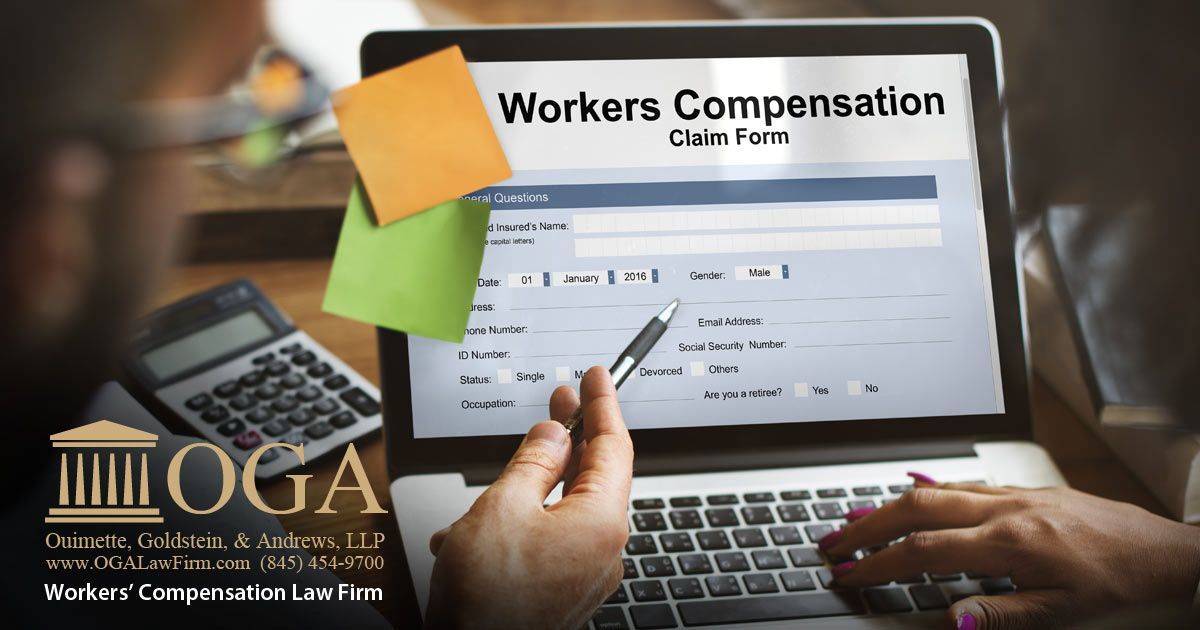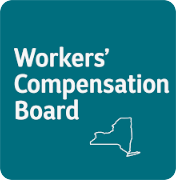New York State Workers' Compensation Law Firm Ouimette, Goldstein, & Andrews, Serving Clients of the Hudson Valley for Over 46 Years
Workers' compensation helps employees injured at work or suffering from illnesses caused by their work environment. It is an insurance program that protects people by paying work-related medical bills and covering wages when illness or an injury prevents an individual from performing their job.
The New York State (NYS) Workers' Compensation Board (WCB) renders all decisions regarding any monetary or medical disputes. You must file your claim with the Worker's Compensation board promptly. If you file your claim untimely, you may lose out on medical or cash benefits. If the insurance company is paying you incorrectly or not authorizing and paying for medical treatment, injured workers or their representatives will need to request the Workers' Compensation board to make proper findings.
Employees should notify their employer of any injury or illness occurring in the workplace as soon as possible. New York workers have 30 days to take this action and must make their notification in writing. To qualify for compensation benefits, the injured employee or their employer must file and submit a claim form to the compensation board and miss at least 14 days of paid work because of the injury.
Second, to qualify for compensation benefits, the injured employee/worker should visit a doctor as soon as possible to document the body sites that were injured in the accident. Third, the injured worker should consult with our Workers’ Compensation Lawyers to understand their rights and for the submission of proper claim forms (C3) with the Workers’ Compensation Board.
The agency bases the amount of the tax-free compensation the employee receives on the average weekly gross wages they earned over the previous 52 weeks. The payment also matches the degree of disability. For example, an injured worker who is 100% disabled (totally disabled) will receive 2/3's of their average weekly wage (AWW) to the statutory maximum. The statutory maximum changes each year on July 1. An injured worker with a 50% disability should receive compensation benefits equal to 50% of 2/3's of their AWW.
Why You Need a Workers' Compensation Lawyer
The insurance company will not accept all injury and illness claims. The insurance company will likely hire lawyers or representatives thus, it is recommended for the injured worker to have a workers’ compensation attorney. Some employers do not file forms in time despite receiving notification of an accident. A company may attempt to keep its insurance rates lower and prevent claims or do so to hide a dangerous work environment.
To prevent this, our workers' compensation lawyers represents the injured employee. They ensure the claim form is accurate and complete and help prove the legitimacy of injuries if the employer denies the accident happened at work.
The process of making a Workers' Compensation claim is as complex as it is detailed. In addition, there are specific timelines for critical events to occur in order for a Workers' Compensation claim to be awarded. It is a process best left to legal experts with extensive experience and a proven success rate. The Workers' Compensation law firm of Ouimette, Goldstein, & Andrews provides clients with the peace of mind of knowing their claims are processed and managed by a legal team that only handles injury claims with Workers' Compensation and Social Security disability.
Here are some examples of detailed legal services you may need from Ouimette, Goldstein, & Andrews:
Monetary Benefits
There is a seven-day waiting period for the injured worker to receive any cash benefits. Once an injured worker loses greater than seven days cumulatively, and there is medical evidence supporting the injured worker's inability to work, the insurance company must start paying the injured worker. Once the injured worker is out of work for more than 14 days, cumulatively, they are entitled to cash monetary benefits back to the first day out of work. As long as the injured worker has medical evidence of a disability, every 90 days, the worker can claim ongoing monetary cash benefits.
Temporary Disabilities
Temporary disability benefits are monetary benefits an injured worker receives up until the time that they are found to have a permanent disability by the Worker's Compensation board. The injured worker can receive benefits while out of work with a temporary disability. Further, the individual can receive monetary benefits if they are back to work with the disability but are making less money due to the disability.
Permanent Total Disability
Permanent total disability. Once an injured worker is at maximum medical improvement (MMI) they can be classified with either a permanent partial disability or a permanent total disability if they have a non-extremity type injury or extremity injury that does not result in a permanent schedule loss of use (SLU). An injured worker has a permanent total disability because of their injury when their injury prevents them from working in any capacity. They are considered permanently 100% disabled. An injured worker has a permanent partial disability when their permanent disability is less than a 100% impairment. A permanent SLU is an award for the permanent defect in an extremity
Section 32 Settlements
Section 32 settlements or waiver agreements happen when the workers' compensation insurance carrier and the injured party agree to a one-time settlement for lost income and/or medical benefits. The injured worker receives a one-time lump sum payment or an annuity, and the weekly benefits end. The offer should always involve a workers' compensation law firm because the claim is closed once the claimant accepts the offer.
Construction Accidents
Accidents occurring on construction sites can often involve severe injuries and permanent disabilities. Depending on the type of accident, there may be Third party action lawsuit in addition to the Worker's Compensation claim. It is important to have a workers’ compensation lawyer with knowledge of the interplay between Workers’ Compensation and third-party labor law-type lawsuits.
Motor Vehicle Accidents
Workers' compensation covers the cost of injuries received from a motor vehicle accident if it happened while the employee was performing a work-related task. Legal guidance can help employees when they need to prove the trip was for business purposes. A work-related motor vehicle accident can result in both the Workers' Compensation claim and a lawsuit. It is important to have a workers' compensation lawyer with knowledge of the interplay between Workers' Compensation, no-fault claims, and a lawsuit.
Arm Injuries - Shoulder, Elbow, Wrist, Hand, Fingers
Arm injuries can involve broken bones, dislocations, damaged nerves and tendons, or the severing of a limb. Workers' compensation cases involving these injuries may require surgery, extensive testing, and rehabilitation. Permanent disability can occur if a worker becomes partially paralyzed or a limb is severed. Typically, if there is permanency, an injury to the arm will result in a permanent loss of use (SLU). The amount of the loss of use will dictate how much money the injured worker receives.
Leg Injuries – Hips, Knees, Ankle, Toes
Like arm injuries, an accident involving the legs, hips, or feet can vary in what compensation someone receives. A broken leg or foot may reduce the ability of the worker temporarily. An amputated or paralyzed leg may mean permanent disability. Typically, if there is permanency with a leg injury, it will result in a permanent loss of use (SLU). The amount of your loss of use will dictate how much money the injured worker receives.
Loss of Vision
Vision loss claims include those that happen because of long-term exposure to light or chemicals and traumatic injuries affecting the eye, face, or brain. These incidents may require legal advice since vision loss may not always occur because of a direct injury to the eye. However, if there is a permanent vision loss to an eye the injured worker should receive a monetary award in addition to lifetime medical.
Loss of Hearing
Claims for hearing loss. A work-related hearing loss can be from an acute trauma or a result of exposure to loud noises over a prolonged period. Exposure to loud noises over a prolonged period of time is called an occupational hearing loss. For example, an insurer or employer may suggest the loss was present before employment with the current company. Others may state that personal behaviors like not wearing required hearing protection at work or listening to music too loudly caused the loss. Some employers may even suggest that hearing loss is a natural part of aging.
Medical Treatment
Workers' compensation medical benefits can cover treatment costs for those who miss work and those who do not. Employees injured on the job may not have a severe enough injury to lose work time and may only need medical treatment. Workers' compensation will cover the medical costs for these injuries when workers submit a claim.
Vocational Rehabilitation
An injury may require an employee to find an alternative position within the company if they are not 100 percent disabled but cannot perform their current job. Vocation rehabilitation services under workers' compensation help the employee find a position that meets medical restrictions and offers wages comparable (or as close as possible) to the pre-claim wage. Employees may need this change temporarily or permanently based on the injury severity.
Head Injuries - Concussion, Traumatic Brain Injury
Head injuries are some of the most damaging workplace incidents. Concussions and traumatic brain injuries can have lifelong repercussions. Unfortunately, many people are unaware of how their injury may affect them later in life, even after the original damage heals. Any head injury needs immediate treatment and follow-up exams to determine the potential for additional health concerns and to calculate future medical costs.
Spine Injuries - Neck, Back, Discs, Spinal Cord, Nerves
Despite the potential severity of spinal injuries, many employees may receive a misdiagnosis. Doctors may diagnose the pain as muscle spasms or strains and not provide the screening needed to diagnose and treat the problem. As a result, an employee may miss work but not receive compensation when an inaccurate diagnosis occurs. A workers' compensation lawyer can help employees receive the diagnosis and compensation they deserve.
Facial Disfigurement and Scarring
Workers' compensation must cover the medical expenses and lost wages of employees who experience a facial injury. Those with significant scarring or disfigurement are also eligible for additional compensation even when the scars do not reduce their ability to work. A workers' compensation attorney can help people to receive more compensation for this type of incident.
Slips and Falls
One of the most common claims is for slip and fall injuries. Workers' compensation covers these accidents, but claim denials can arise if the accident happened outside of the workplace, like on a sidewalk or in a parking lot. Our Workers' Compensation attorneys can help people denied benefits unfairly for a slip and fall.
Repetitive Stress Injuries and Overexertion Injuries
The uniqueness of repetitive injuries is that there is no single incident responsible. The worker becomes injured over weeks, months, or longer while performing the same motion repeatedly. Pain, numbness, and stiffness can develop slowly and become severe before the employee realizes it is job-related. Many types of repetitive injuries require surgery or therapy and reduce the ability to perform a job. Workers' compensation covers the costs of treating injuries like these and any lost time needed for healing.
Contact Our OGA Law NYS Workers' Compensation Attorneys for a Free Consultation
At Ouimette, Goldstein, & Andrews law, we can help workers to get the compensation they deserve. As a workers' compensation law firm, our staff can assist with filing a claim, appealing a denial, and more.
Contact us today for a free consultation.
Additional References
- Worker's Compensation - NYS Worker's Compensation Board






